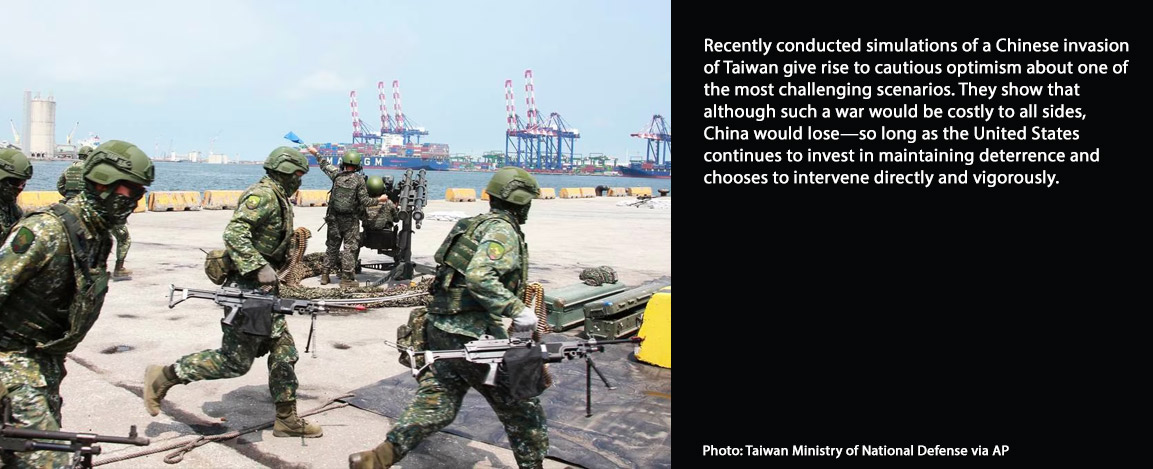CIS Principal Research Scientist Eric Heginbotham is a specialist on Asia security issues. In this opinion piece for Newsweek, originally published here, he argues that based on a recently published war game he developed with the Center for Strategic and International Studies, "the prospects for a successful Chinese invasion of Taiwan are poor."
A war over Taiwan would directly challenge US interests. Avoiding such a conflict while still maintaining American goals for peace and security is among the most vexing problems confronting US political leaders. However, recently conducted simulations of a Chinese invasion of Taiwan give rise to cautious optimism about one of the most challenging scenarios. They show that although such a war would be costly to all sides, China would lose—so long as the United States continues to invest in maintaining deterrence and chooses to intervene directly and vigorously.
Together with colleagues from the Center for Strategic and International Studies and the US Naval War College, I developed and ran 24 iterations of a wargame modeling a Chinese invasion of Taiwan in 2026. Dozens of current and retired senior military officers and policymakers participated in the wargame. Because there is no precedent for large, modern air and naval conflicts—and therefore very little data about how modern weapons would perform—we varied assumptions about the performance of key weapons systems across many of the games.
The project reached two broad conclusions. First, despite China's robust and growing military capabilities, the prospects for a successful Chinese invasion of Taiwan are poor. Second, losses would be high, including among US forces. Media attention has focused on these high casualties, but the operational outcomes are arguably more important in considering questions of war and peace, deterrence, and US policy.
Several important assumptions underlie our conclusions. The United States must intervene directly and forcefully. Japan must allow the United States to use bases in that country for combat operations. And Taiwanese ground forces must resist stubbornly. So long as those conditions hold, then the results are robust across a range of other circumstances modeled by the simulation. Except when the United States did not intervene, China was denied anything resembling a clear victory in all the games played. Many saw defeat on a grand scale that would threaten the regime in Beijing.
Those operational results were driven by several hard truths confronting any Chinese invasion. To achieve its objective of reunifying Taiwan through invasion, the People's Liberation Army would need to maintain an invasion fleet off Taiwan's coast for a period of weeks. Under current technological circumstances, warships—whether Chinese or American—are highly vulnerable to large salvos of missiles. In the wargame, attrition to the Chinese amphibious fleet inflicted by shore-based missiles, submarines, tactical aircraft, and bombers, was unstainable to even China's large and growing fleet.
The thousands of US casualties suffered in these games, as well as hundreds of US aircraft and one or two dozen US ships destroyed in most simulations, were driven largely by the same types of offensive technologies that proved lethal to PLA invasion forces. As noted in the report, those losses were sobering, and our recommendations therefore focused largely on ways to reduce those prospective casualties. Doing so should be a major priority for US defense planners.
However, the fact remains that China's goal in invading Taiwan would not be to inflict casualties, but rather to occupy the island, subdue resistance, and incorporate Taiwan into the PRC. An invasion would carry enormous political, reputational, and economic costs for Beijing. To have any hope of success, China would almost certainly have to attack US bases in Japan, putting it in direct conflict with both the world's first (US) and third (Japanese) largest economies. And it would have to do that while conducting a major amphibious invasion, a type of military operation that most military professions regard as one of the most difficult.
For decades, the United States and its allies prepared for a hypothetical battle with the Soviet Union and its Warsaw Pact. Such a war would have been terrible in the extreme and would likely have escalated to the nuclear level. Then as now, the point of preparing for war was to avoid conflict. In the end, that result was produced during the Cold War through military preparation, a demonstrated will to defend, and sagacious diplomacy with our potential adversary, as well as with allies.
All of these elements, tailored for the specific circumstances of East Asia, are needed today to achieve the same positive outcome. Beijing is unlikely to embark on military adventure unless it believes the probability of success is high—or unless it views such as an operation as its only option.
US policy should rest on a mature confidence. The United States should continue to invest in capabilities that will maintain deterrence. Those capabilities would include first and foremost numerous and powerful anti-ship capabilities, as well as naval and air forces that are reorganized and reequipped to fight from dispersed and survivable positions. It should work with Japan to ensure common cause and the preparation of military forces and infrastructure. And it should encourage Taiwan to improve asymmetric capabilities and the morale of its own armed forces.
Finally, the United States should ensure that the political relationship with China remains positive in those areas that do not directly compromise America's position and — consistent with U.S. policy for half a century—that avoid promoting de jure independence for Taiwan. We should, in other words, not blink in our competition with China, but nor should we back Beijing into a corner.
Eric Heginbotham is a principal research scientist at MIT's Center for International Studies and a specialist on Asian security issues. Before joining MIT, he was a senior political scientist at the RAND Corporation where he led research focused on Chinese military capabilities and strategic decision making.




